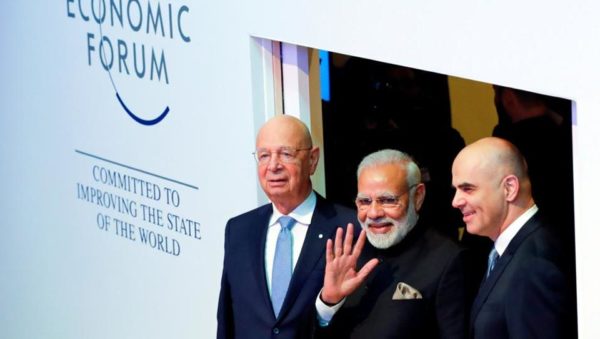Protectionism is gaining ground and globalisation is losing its appeal, but India is open for business, Indian Prime Minister Narendra Modi told the World Economic Forum on Tuesday.
Modi is leading a big government and business delegation to the summit in Davos, the first Indian prime minister do so in 21 years, aiming to showcase India as a fast-growing economic power and a potential driver of global growth. Modi underlined the progress India had made since his predecessor Deve Gowda attended the summit in 1997, saying India’s GDP has grown more than six times from $400 billion then, and should reach $5 trillion by 2025.
His comments on rising trade barriers came ahead of an address to the forum later this week by US President Donald Trump, who has championed inward looking policies for the world’s biggest economy.
“Instead of globalisation, the power of protectionism is putting its head up. Their wish is not only to save themselves from globalisation, but to change the natural flow of globalisation,” Modi said at the opening of the forum, which has attracted 70 heads of state and government, chief executives and top bankers.
“The result of this is that we are seeing new types of tariff and non-tariff-based barriers being imposed. Bilateral and multilateral trade negotiations appear to have come to a halt.
“There is a slowdown in cross-border financial investments and the expansion of (the) global supply chain appears to have slowed down.”
Without directly mentioning Trump or the US, he said “the solution to this worrisome situation against globalization is not isolation.”
Trump has been pushing an “America First” policy of getting businesses to invest in the United States instead of overseas, potentially affecting the growth prospects of emerging economies such as India dependent on foreign investment.
During his 2016 election campaign, Trump blamed globalisation for ravaging US manufacturing jobs as companies sought to reduce labor costs by relocating to Mexico and elsewhere. Trump is due to address the forum on Friday.
In his speech delivered in Hindi, Modi emphasised that a predictable, stable, transparent and progressive India is good news in an otherwise uncertain global environment.
Pitching India as an investment destination, Modi said the government is following the principle of reform, perform and transform.
“We have made it so easier to invest in India, manufacture in India and work in India. We have decided to uproot licence and permit Raj. We are replacing red tape with red carpet,” he added.
Referring to WEF’s theme of ‘Creating a shared future in a fractured world’, he said the Indian philosophy of ‘Vasudhaiva Kutumbakam’ (the world is one family) has become more relevant today to address global fissures.
Modi said climate change was a major threat to the world, yet the world had failed to come together to tackle it. He said everyone wanted carbon emissions to be cut, but the rich world was not ready to help developing economies with new technology.
Modi also highligted terrorism as a “serious” global challenge. While terrorism is dangerous what is equally dangerous is the “artificial distinction” made between ‘good terrorist’ and ‘bad terrorist’, said the prime minister.
Separately, Modi also met top global CEOs at an International Business Council event where he briefed them on India’s growth story and the opportunities available in the country. He also met Canadian Prime Minister Justin Trudeau, Queen Maxima of the Netherlands and a group of Indian CEOs including Rahul Bajaj, Chanda Kochhar, Uday Kotak, Naresh Goyal, N Chandrasekaran, Anand Mahindra, Sunil Mittal, Ravi Ruia and Chandrajit Bannerjee.



Leave a reply